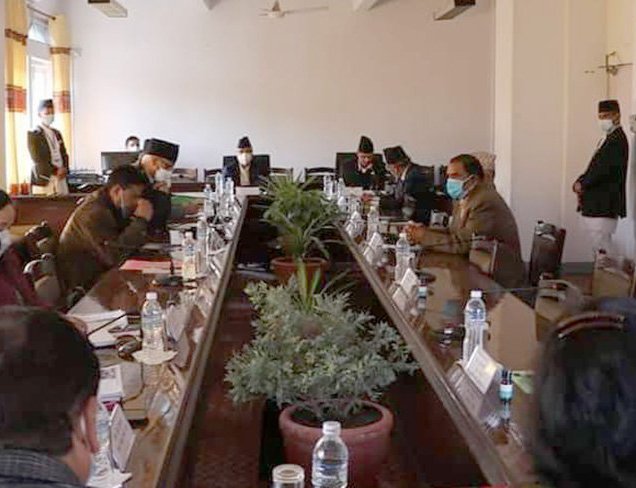
In parliamentary democracies, a single party is often unable to command a majority to support the legislature, therefore, political parties wishing to form and be part of the government to exercise executive power typically may be compelled to enter into some form of post elections coalition. Two alternatives are available for building such a coalition. The first one is a pre-election coalition and the second one is a post-election coalition. The pre-election coalition is a kind of agreement between or among parties prior to the elections with an assumption that the parties in the agreement would be able to bag a majority and become coalition partners in the forming of the government. However, an overwhelming amount of the written literature and even practice aspect of politics have often ignored this phenomenon, assuming that this is an unholy practice in democracy and against democratic ideals. The post-election coalition is highly practiced and considered a norm rather than an exception in the parliamentary democracies of the world. The former alternative—pre-election coalition, an unholy bonding—raises a number of questions including distinct ideologies of political parties as it forces people to vote for a candidate whom they do not want and think the right person based on their political party affiliation and alignment. It can further raise questions on political, philosophical and ideological similarities and differences. Even the necessity of the existence of many political parties in a country is questioned as they engage in fighting elections alike as one party with common agendas, not in wartime but in peacetime, therefore, this practice must be understood to be unholy and unhealthy for nurturing and flourishing of democracy and democratic ideals.
In Nepal, coalitions for elections or pre-election coalitions is trending in recent elections, particularly with those political parties whose political ideologies and philosophies do not match at all as they fall in the category of either 'far right' or 'far left, at least, in theory. Yet, they form a pre-election coalition because their intuitions and public perceptions make them think that they are fragile; people do not trust them and vote for them so that they would be able to form the next government. In such contexts, some cynics may think that a pre-election coalition is not absurd but in fact, it is not as simple as it is defined and flouted by politicians for public consumption. Pre-election coalition generates a number of fundamental questions relating to, inter alia, fundamental rights of people, philosophical and ideological differences of political parties and democratic ideals. Some may argue that politics of consensus and pre-election coalitions are similar and since consensual politics has been popular in Nepal since 2006, it is fine for political parties to form pre-election coalitions as well. Yet, here, we must note that consensual politics and pre-election coalitions are different and are being practiced in distinctly different national contexts—the former in the time of war but the latter is being practiced in the time when there is no war and warring parties. In fact, the politics of consensus started in 2006 and contributed to establishing the Comprehensive Peace Accord—an attempt to circumvent confrontation between parties to build a new peaceful and prosperous Nepal, irrespective of divided political ideologies.
Ever since 2006, the politics of consensus is being made more popular in Nepal as a panacea—a mantra to depend upon to resolve any political crises, bringing warring parties into peace in wartime to cooptation for corruption. While consensus politics sounds extremely positive, Nepal had used it to bring warring parties into peace but it is rarely practiced in any existing competitive democratic systems throughout the world today, particularly when the countries have an orientation toward peace and democracy. In historical time, when the country had been engulfed by war and had been in an extremely critical socio-political context, it was the need for time to direct the country towards peace, therefore, consensual politics was a necessary approach to bring all political forces together, keeping all political ideological differences aside. But history has changed now. The country has moved towards peace from war, therefore, it is necessary for political parties to follow the path of political and ideological competition based on the parties' philosophies and ideologies they align. Because, for democracy to be vibrant and flourish, ideological differences and policy-wise competitions between political parties are fundamental, which empower citizens and this empowerment is realized through a variety of liberal and competitive political institutions. And this can only be realized through free, fair and periodic elections in which citizens can participate as voters and as candidates; candidates know what political philosophy and ideology they are promoting to contest elections and what newer policies they are going to introduce guided by their political philosophy and ideology, and voters are clear that why they are voting and who they are going to vote for.
But the fundamental rights of people—the freedom of choice and the freedom of electing political leadership from a party based on political parties' ideologies and philosophies—are consistently being violated by the pre-election coalition of the political parties in Nepal. The million-dollar point is that having regular and periodic elections ensure only partial democratic ideals because such periodic elections do not tend to be free and fair due to pre-election coalition. Voters even do not know who they are voting for—for example—a citizen who attaches himself or herself to Nepali Congress is forced to Maoist candidate and vice versa due to an unholy pre-election coalition. Therefore, political parties must now understand and believe in their political ideals, philosophies and ideologies to test them and their legitimacy by standing with their party-based distinct identity in the elections without forming a pre-election coalition and blurred identity. Blurred identity does provide any clear message to people and elected officials also do not become accountable to the public and are very unlikely to practice good governance. Hence, political parties must say NO to pre-election coalitions to win elections by hook and crook, failing the country and sacrificing the fundamentals of democracy and violating the rights of the people.
Dr. Chandra Lal Pandey. Dr. Pandey can be reached at: pandeycl@gmail.com
- 16thPeriodic Plan for Delivering Basic Services and Fundamental Rights?
- Feb 08, 2024
- Disaster Governance: Theory And Practice In Nepal
- Dec 05, 2023
- Haphazard Urbanization Or Sustainable Smart Cities In Nepal?
- Jun 28, 2023
- Nepalis Are Optimistic:Findings Of SNP 2020
- Apr 12, 2021
- Corruption: Practices & Remedies
- Oct 02, 2020

















